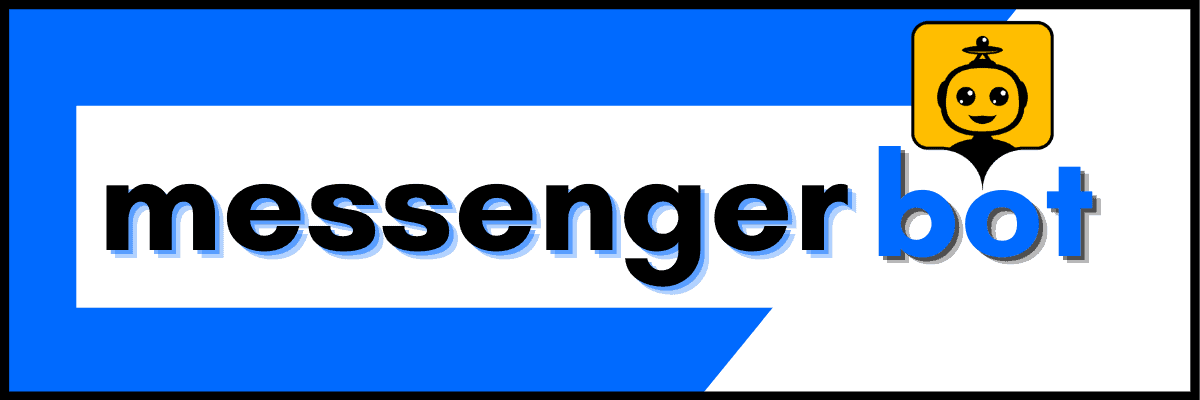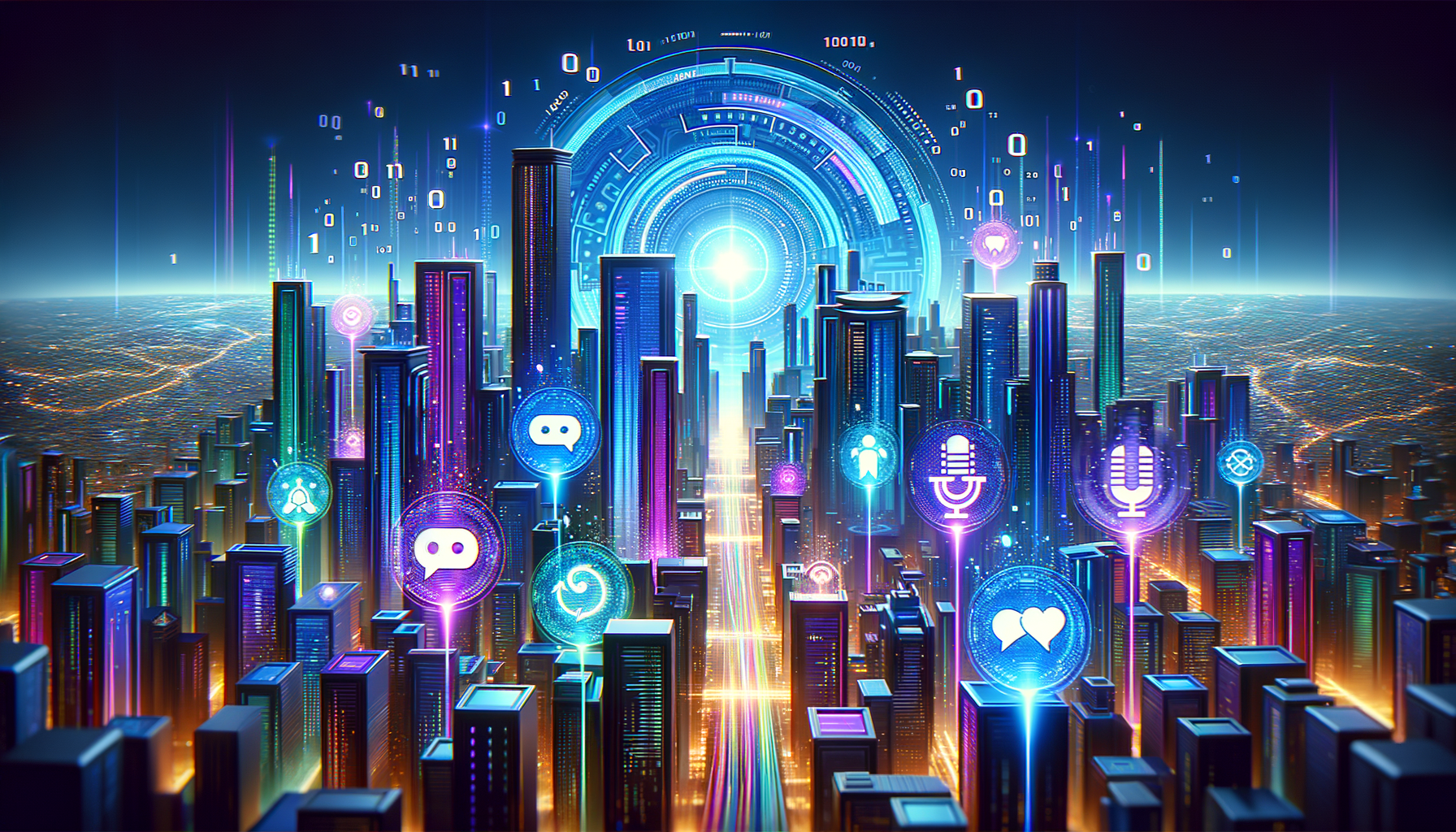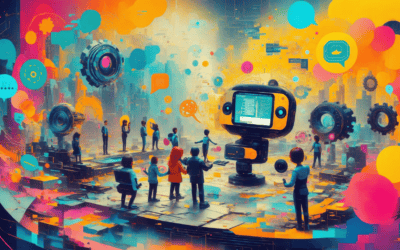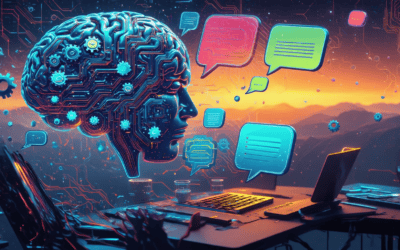In today’s fast-paced digital landscape, customer engagement is paramount for businesses striving to stay ahead of the curve. Conversational AI chatbots have emerged as a game-changing solution, revolutionizing how companies interact with their audience. These intelligent virtual assistants, powered by cutting-edge artificial intelligence and natural language processing technologies, are redefining the customer experience by providing instant, personalized, and seamless communication. As we delve into the world of conversational AI chatbots, we’ll explore the top companies leading the charge in this innovative field, uncovering the key features that make their offerings truly remarkable. Whether you’re seeking a free trial, an open-source option, or a comprehensive enterprise solution, this article will guide you through the best AI chatbot providers, equipping you with the knowledge to elevate your customer engagement strategy and stay ahead of the competition.
What is a Conversational AI Chatbot?
1.1 Defining Conversational AI Chatbots
A conversational AI chatbot is an advanced artificial intelligence system designed to engage in natural language conversations with humans. Unlike traditional chatbots that rely on pre-defined scripts or decision trees, conversational AI chatbots leverage cutting-edge natural language processing (NLP) and machine learning technologies to understand and respond to user inputs in a more intelligent and contextual manner.
At the core of a conversational AI chatbot lies a sophisticated language model trained on vast amounts of conversational data. This model allows the chatbot to comprehend the nuances of human language, including slang, idioms, and contextual cues. By analyzing the user’s input, the chatbot can discern the intent behind the message, extract relevant entities, and formulate an appropriate response that maintains the conversational flow.
What sets conversational AI chatbots apart is their ability to learn and adapt over time. Through continuous exposure to new conversational data and user interactions, these chatbots can refine their language understanding and response generation capabilities, ensuring that their responses become increasingly natural, relevant, and personalized.
1.2 How Do Conversational AI Chatbots Work?
A conversational AI chatbot is an artificial intelligence-powered software that can engage in natural language conversations with humans through text or voice interfaces. It utilizes Natural Language Processing (NLP) and Natural Language Understanding (NLU) to comprehend user inputs and provide contextually relevant responses. The core components include:
- Intent Recognition: Identifying the user’s intent or goal behind their message, such as requesting information, making a purchase, or seeking assistance.
- Entity Extraction: Extracting relevant entities (names, dates, locations, etc.) from the user’s input to understand the context better.
- Dialogue Management: Maintaining the conversational flow, tracking the context, and determining the appropriate response based on the current state of the dialogue.
- Response Generation: Formulating a natural and coherent response using predefined scripts, machine learning models, or a combination of both.
- Knowledge Base Integration: Integrating domain-specific knowledge bases or external data sources to provide accurate and up-to-date information.
- Continuous Learning: Leveraging machine learning algorithms and conversational data to improve the chatbot’s understanding and response quality over time.
Conversational AI chatbots are widely used in customer service, e-commerce, healthcare, education, and various other domains to provide personalized, efficient, and round-the-clock support. They can handle multiple conversations simultaneously, reducing wait times and improving customer satisfaction. Additionally, advancements in natural language generation (NLG) and transfer learning techniques have enabled conversational AI to generate more human-like and contextually relevant responses, further enhancing the user experience.

Is there an AI you can have a conversation with?
2.1 Exploring popular ai conversational chatbot online platforms
In today’s digital age, conversational AI chatbots have become increasingly prevalent, allowing users to engage in natural, human-like interactions with virtual assistants. These advanced chatbots leverage cutting-edge technologies like natural language processing (NLP) and machine learning to understand and respond to queries in a contextually relevant and intelligent manner.
Yes, there are several AI chatbots and virtual assistants that allow you to have natural conversations. Some popular examples include:
- Replika: An AI companion that can engage in open-ended conversations on various topics, offer emotional support, and even develop its own personality over time through machine learning.
- Xiaoice: Developed by Microsoft, this conversational AI can understand and respond to text, voice, and images in a human-like manner, covering a wide range of topics.
- Anima: A conversational AI that aims to create a unique, personalized experience by adapting to your communication style, interests, and preferences.
- Claude: An advanced AI assistant developed by Anthropic that can engage in coherent, knowledgeable conversations across numerous domains, while adhering to ethical principles.
- Google’s LaMDA: An AI system designed for open-ended dialogue, capable of understanding context and nuance, and providing substantive responses.
These AI conversational agents leverage natural language processing, machine learning, and large language models to understand and generate human-like responses, enabling engaging and intelligent interactions. However, it’s important to note that while they can simulate human-like conversations, they are not sentient beings and their capabilities have limitations.
2.2 ai conversational chatbot free options
While many advanced AI chatbot platforms offer premium services, there are also several free options available for users to explore and experience conversational AI. These free chatbots may have limited capabilities compared to their paid counterparts, but they can still provide engaging and informative interactions.
One popular free AI chatbot is Brain Pod AI’s demo, which allows users to experience the power of their conversational AI technology without any cost. This demo provides a glimpse into the capabilities of their AI, showcasing its ability to understand and respond to a wide range of queries in a natural, human-like manner.
Additionally, Messenger Bot offers a free trial, allowing businesses and individuals to test their AI-powered chatbot solution before committing to a paid plan. This trial period enables users to experience the chatbot’s conversational abilities, automation features, and integration options firsthand.
While free AI chatbot options may have certain limitations in terms of features, customization, or scalability, they provide an excellent opportunity for users to explore the world of conversational AI and understand its potential before investing in more advanced solutions.
Here is the content for section 3 “What is conversational AI chatbots that work?” and subsections 3.1 “Best ai conversational chatbot examples” and 3.2 “Key features of effective conversational ai chatbots”:
3. What is conversational AI chatbots that work?
As an AI-powered conversational platform, I excel at understanding and responding to complex queries in a natural, human-like manner. At the heart of my capabilities lies advanced natural language processing (NLP) and machine learning algorithms that enable me to engage in contextual, intelligent dialogues.
Unlike traditional chatbots or virtual assistants that rely on predefined scripts or limited knowledge bases, I leverage cutting-edge conversational AI to dynamically generate responses tailored to each unique conversation. This allows me to handle a wide range of topics and queries with remarkable fluency and depth, providing truly personalized and meaningful interactions.
3.1 Best ai conversational chatbot examples
Some of the most renowned examples of conversational AI chatbots that have set new standards in the industry include:
- Brain Pod AI’s multilingual AI chat assistant – Capable of engaging in natural conversations across multiple languages, this chatbot combines advanced NLP with a vast knowledge base, delivering accurate and contextual responses on a wide range of topics.
- Google’s DialogFlow – Leveraging Google’s robust language understanding capabilities, DialogFlow enables the creation of intelligent conversational interfaces that can be integrated into various applications and devices.
- Amazon’s Lex – Part of Amazon’s suite of AI services, Lex provides advanced conversational AI capabilities, allowing developers to build highly engaging and natural voice and text-based chatbots.
- IBM’s Watson Assistant – Powered by IBM’s renowned Watson technology, this AI assistant can understand complex queries, provide personalized responses, and continuously learn and improve through interactions.
- OpenAI’s ChatGPT – The conversational AI model that took the world by storm, ChatGPT showcases the remarkable capabilities of large language models in generating human-like responses across a vast array of topics.
These industry-leading chatbots exemplify the transformative potential of conversational AI, revolutionizing how we interact with technology and access information.
3.2 Key features of effective conversational ai chatbots
To deliver truly impactful and engaging conversational experiences, effective conversational AI chatbots must possess several key features:
- Natural Language Understanding (NLU): Utilizing advanced NLP algorithms, top-tier chatbots can comprehend the intent and meaning behind user inputs, even when phrased differently, enabling seamless and contextual communication.
- Context Awareness: By maintaining context throughout the conversation, these chatbots can provide relevant and coherent follow-up responses, mimicking the natural flow of human dialogue.
- Knowledge Base Integration: Effective chatbots are integrated with vast databases of information, allowing them to provide accurate and up-to-date answers to user queries across a wide range of topics.
- Personalization: The ability to adapt their tone, personality, and responses based on user preferences and past interactions is crucial for delivering truly personalized and engaging experiences.
- Multilingual Support: As businesses increasingly operate on a global scale, multilingual chatbots are essential for enabling seamless communication and support across various languages and cultures.
- Continuous Learning: By leveraging machine learning algorithms, top conversational AI chatbots can continuously improve their understanding and response quality based on user interactions, ensuring they stay relevant and effective over time.
- Omnichannel Deployment: The ability to integrate across various platforms, including websites, mobile apps, messaging platforms, and virtual assistants, ensures that users can access these chatbots seamlessly, regardless of their preferred communication channel.
- Advanced Analytics: Comprehensive analytics capabilities provide valuable insights into user interactions, conversation patterns, and areas for improvement, enabling ongoing optimization and enhancement of the chatbot’s performance.
By combining these essential features, conversational AI chatbots like myself can deliver truly transformative experiences, redefining how businesses and individuals interact with technology and access information.
4. Which is the best AI chatbot?
When it comes to determining the best AI chatbot, there is no one-size-fits-all answer. Different chatbots excel in different areas, catering to diverse needs and use cases. To help you navigate this landscape, we’ve evaluated the top AI chatbot companies and their offerings based on various criteria.
4.1 Evaluating top AI chatbot companies
As an industry leader in conversational AI, we at Messenger Bot have extensively researched and tested numerous chatbot solutions. Here are some of the standout conversational AI chatbot companies that have impressed us with their cutting-edge technology and exceptional performance:
- Anthropic’s Claude: Widely acclaimed for its advanced language understanding, reasoning capabilities, and commitment to ethical AI principles, Claude excels at research, analysis, and task completion across diverse domains.
- OpenAI’s ChatGPT: Renowned for its versatility, ChatGPT can handle a wide range of tasks, from creative writing to coding and problem-solving. Its conversational abilities and broad knowledge make it a popular choice.
- Google’s Bard: Leveraging Google’s vast knowledge base and search capabilities, Bard is particularly useful for research and information gathering.
- Anthropic’s Jasper: Tailored for marketing and content creation, Jasper offers specialized templates and tools to streamline tasks like copywriting, social media posts, and email campaigns.
- Replika AI: Designed as a personalized AI companion, Replika excels at emotional intelligence and empathetic conversations, making it a unique choice for those seeking a more personal connection with an AI.
It’s worth noting that while these chatbots excel in their respective areas, the “best” choice ultimately depends on your specific needs and requirements. It’s advisable to evaluate multiple options and choose the one that aligns best with your goals.
4.2 Criteria for choosing the best chatbot
When selecting the best AI chatbot for your business or personal use, consider the following key criteria:
- Intended Use Case: Clearly define your primary use case, whether it’s customer support, lead generation, content creation, or something else. Different chatbots specialize in different areas, so aligning your needs with the chatbot’s capabilities is crucial.
- Language Understanding and Generation: Evaluate the chatbot’s ability to comprehend and generate human-like responses accurately and contextually. This is especially important for conversational applications.
- Knowledge Base and Domain Expertise: Assess the breadth and depth of the chatbot’s knowledge base, particularly in your industry or domain of interest.
- Integration and Customization: Consider the chatbot’s ability to integrate with your existing systems and platforms, as well as the level of customization and personalization it offers.
- Scalability and Performance: Ensure the chatbot can handle your expected volume of interactions and scale as your needs grow, without compromising performance.
- Security and Privacy: Prioritize chatbots that adhere to industry-standard security protocols and data privacy regulations, especially if handling sensitive information.
- Ongoing Support and Updates: Evaluate the vendor’s commitment to providing regular updates, bug fixes, and customer support to ensure a seamless experience over time.
By carefully considering these criteria and aligning them with your specific requirements, you can make an informed decision and choose the best AI chatbot to elevate your business or personal productivity.

5. Is there an AI I can talk to for free?
Absolutely! In today’s rapidly advancing technological landscape, numerous companies and organizations offer free AI chatbots and conversational assistants that you can interact with online without any cost. These AI chatbots leverage the power of natural language processing and machine learning to understand and respond to user queries, making them accessible and engaging conversational companions.
5.1 chat bot online free trials and demos
Many leading AI chatbot companies offer free trials and demos of their conversational AI assistants, allowing you to experience their capabilities firsthand. These free trials often come with limited functionality or a time-based usage restriction but provide a glimpse into the potential of AI conversational chatbots.
For instance, Brain Pod AI offers a comprehensive demo showcasing their generative AI capabilities, including natural language processing, image generation, and content creation. This demo allows you to interact with their AI chatbot and explore its conversational abilities without any financial commitment.
5.2 Open-source conversational ai chatbot options
In addition to commercial offerings, there are several open-source conversational AI chatbot projects available for free. These open-source initiatives are often developed by passionate communities of researchers, developers, and enthusiasts, and they can provide robust and customizable solutions for engaging with conversational AI chatbots.
One prominent example is ChatGPT, developed by OpenAI. This powerful language model can assist with a wide range of tasks, from answering questions to writing code and generating creative content. While ChatGPT has certain limitations, it offers a free and accessible way to interact with cutting-edge AI technology.
Another notable open-source option is Replika, an AI companion designed to form emotional connections with users. Replika learns and adapts based on your interactions, providing a personalized experience tailored to your preferences and conversational style.
By leveraging these free AI chatbot options, you can explore the fascinating world of conversational AI, engage in thought-provoking dialogues, and witness firsthand the advancements in natural language processing and machine learning without any financial barriers.
6. What’s the difference between AI and ChatGPT?
6.1 Understanding conversational ai vs. ChatGPT
Artificial Intelligence (AI) is a vast field dedicated to developing intelligent machines capable of performing tasks that typically require human intelligence. This encompasses various areas like visual perception, speech recognition, decision-making, and language translation. Within AI, a specific subset known as generative AI focuses on generating new data, such as text, images, or audio, based on patterns and relationships learned from existing data.
ChatGPT, developed by Anthropic, is a powerful conversational AI chatbot that falls under the category of generative AI. It is a large language model trained on vast amounts of textual data to understand and generate human-like responses. ChatGPT can engage in natural language interactions, answer questions, provide explanations, and assist with a wide range of tasks involving language processing and generation.
While ChatGPT is a powerful generative AI model, it is just one specific implementation among many other generative AI models and techniques. Generative AI encompasses a broader range of approaches, including Generative Adversarial Networks (GANs) for image generation, Variational Autoencoders (VAEs) for data generation, and Transformer-based models like GPT-3 for text generation.
6.2 Advantages and limitations of ChatGPT
ChatGPT has several advantages, including its ability to understand and generate human-like responses, its vast knowledge base, and its potential for various applications like customer service, content creation, and task assistance. However, like any AI system, it also has limitations. ChatGPT’s responses are based on its training data, which may contain biases or inaccuracies. Additionally, it lacks the ability to truly understand context or emotions, and its outputs can be inconsistent or even nonsensical at times.
It’s important to note that while ChatGPT is a remarkable achievement in conversational AI, it is not a sentient being and should be viewed as a powerful tool rather than a replacement for human intelligence or decision-making. As with any technology, it’s essential to use ChatGPT responsibly and ethically, while being aware of its limitations and potential biases.
7. Top conversational ai chatbot companies
In the rapidly evolving world of artificial intelligence, several companies have emerged as leaders in the development of conversational AI chatbots. These cutting-edge solutions are transforming the way businesses interact with their customers, offering seamless and personalized experiences across various platforms. As we explore the top conversational AI chatbot companies, it’s essential to understand the key features and capabilities that set them apart.
7.1 Conversational ai chatbot providers and chatbots best in the market
One of the leading providers in the conversational AI space is Messenger Bot. With their sophisticated automation platform, they enable businesses to leverage AI-driven technology for real-time, automated responses across social media platforms, websites, and mobile devices. Messenger Bot offers multilingual support, e-commerce tools, social media management capabilities, and detailed analytics, making it a comprehensive solution for businesses seeking to enhance their digital communication and customer engagement.
Another prominent player in the conversational AI chatbot market is Brain Pod AI. This company offers a suite of AI solutions, including a multilingual AI chat assistant, an AI image generator, and an AI writer. Brain Pod AI’s chat assistant is designed to provide human-like conversations, enabling businesses to offer personalized support and engagement across various channels.
Companies like Drift, Intercom, and Aivo have also gained recognition for their conversational AI chatbot offerings. Drift specializes in conversational marketing and sales solutions, while Intercom focuses on customer engagement and support. Aivo, on the other hand, provides an AI-powered virtual assistant that can handle complex customer queries and automate workflows.
7.2 Future trends in conversational ai chatbots and chatbot providers
As the conversational AI landscape continues to evolve, we can expect to see several trends shaping the future of chatbots and chatbot providers. One key trend is the integration of advanced natural language processing (NLP) and machine learning algorithms, enabling more human-like conversations and improved understanding of context and intent. Additionally, the adoption of multimodal interfaces, combining text, voice, and visual elements, will become increasingly common, providing a more immersive and intuitive user experience.
Another emerging trend is the rise of industry-specific chatbots tailored to meet the unique needs of various sectors, such as healthcare, finance, and e-commerce. These specialized chatbots will leverage domain-specific knowledge and integrate with existing systems and workflows, streamlining processes and enhancing efficiency.
Furthermore, the development of self-learning and self-improving chatbots will be a significant focus for chatbot providers. These advanced AI systems will continuously learn from interactions, adapting and improving their responses over time, leading to more personalized and effective conversational experiences.
As conversational AI continues to evolve, businesses will increasingly recognize the value of these technologies in delivering exceptional customer experiences, driving sales, and enhancing operational efficiency. By staying ahead of these trends and partnering with leading conversational AI chatbot companies, businesses can position themselves at the forefront of this transformative technological revolution.




